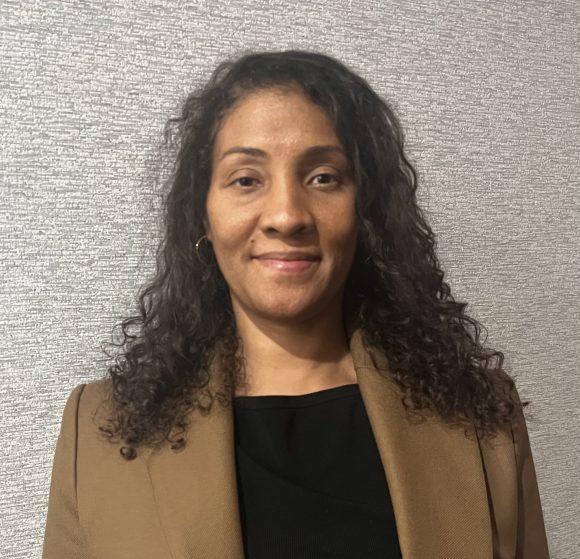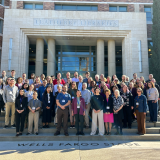Welcome New Schmid Faculty — Nicol R. Howard
Announced on December 18, 2024
 Please join us in welcoming Nicol R. Howard to Schmid College of Science and Technology. Howard will serve as an Associate Professor of Math Pedagogy.
Please join us in welcoming Nicol R. Howard to Schmid College of Science and Technology. Howard will serve as an Associate Professor of Math Pedagogy.
Howard brings over two decades of experience advancing equity in STEM education. Her research employs critical quantitative and mixed methodological approaches to examine learning experiences in mathematics and computer science, with particular attention to family involvement and community engagement. Through her research, she works to ensure educational research serves historically marginalized communities while challenging traditional metrics that may overlook cultural strengths and resources.
Q&A with Nicol R. Howard, Associate Professor of Math Pedagogy
Q: What role were you in before this one?
A:My career path has been shaped by a commitment to advancing equity in education. In my various roles at the University of Redlands over 8 ½ years, I focused on bringing together research and practice to create more justice-oriented learning environments. As a faculty member, administrator, and co-founder/co-director of the Race in Education Analytics Learning Lab (REAL Lab), I worked to ensure that educational research serves the needs of historically marginalized communities. Throughout my roles, my focus remained consistent: using research, teaching, and community engagement to build more equitable educational opportunities, particularly in mathematics and computer science education for underrepresented learners.
Q: What is your current area of research — and why are you passionate about it?
A: My research focuses on advancing equity and justice in STEM and computer science education, particularly emphasizing the experiences of Black girls and other marginalized learners. This passion stems from my deep understanding of how intersecting forms of oppression can impact educational opportunities. I use critical quantitative and mixed methods approaches to examine how we can better support learners by centering their experiences and amplifying their voices.
One of my most meaningful projects explored how Black girls define family involvement differently than traditional metrics suggest. Rather than just counting parent attendance at school events, colleagues and I found that meaningful conversations about education and support from extended family networks – what scholars call “fictive kinship” – played crucial roles in these learners’ mathematics achievement. This research has led to grant-funded projects examining how Black women role models and family engagement can create more inclusive STEM learning environments. My work brings together communities, educators, and researchers to develop practical solutions for closing divides while honoring cultural knowledge and experiences.
Q: What are you looking forward to most this semester?
A: I’m particularly excited about advancing several initiatives that bring together my passion for equity in mathematics education with community engagement. This semester also brings opportunities to mentor the next generation of STEM educational researchers and practitioners who are committed to advancing equity in education. Working with students who are exploring everything from culturally responsive pedagogies to technological justice initiatives keeps me hopeful about the future of education.
Q: Schmid College believes that the best science happens when diverse individuals are supported, included and empowered to share their voices as a part of scientific discovery. What do diversity, equity, and inclusion mean to you?
A: My stance on diversity, equity, inclusion, and belonging is deeply rooted in both research and lived experience. I’ve seen how transformative education can be when we create spaces where all learners – particularly those historically marginalized in STEM fields – are truly heard and supported.
In my research with Black girls in mathematics and computer science, I’ve documented how traditional metrics often fail to capture the rich cultural and familial resources these students bring to their learning. For example, one study revealed that when we expanded the definition of “family involvement” beyond traditional school-based activities to include the cultural practice of storytelling and extended family networks, we uncovered powerful support systems that were previously invisible to researchers and educators.
This work has taught me that true inclusion and justice isn’t just about increasing numerical representation – it’s about fundamentally reimagining how we measure success, engage communities, and validate different ways of knowing. In my role leading the Race in Education Analytics Learning Lab, I’ve used critical quantitative and mixed methodological approaches that center learners’ experiences and challenge traditional power dynamics in educational research.
My commitment to these principles extends beyond research into practice. In my prior role, I worked to create institutional structures that support diverse voices, from founding a Black Students, Faculty, Staff, Administrators and Alumni Association to implementing initiatives that address equity gaps. I believe scientific discovery flourishes when we create learning environments that honor the intersecting identities and lived experiences of all participants.
Most importantly, I’ve learned that meaningful inclusion requires sustained effort at both individual and systemic levels. It means constantly examining our own assumptions, actively working to dismantle barriers to participation, and ensuring that our commitment to equity is reflected in everything from our research methodologies to our daily interactions with students and colleagues.

